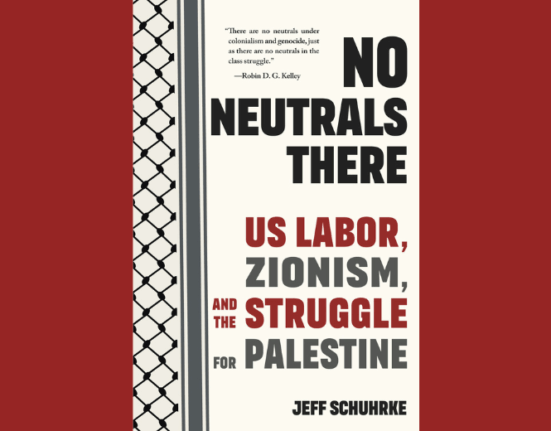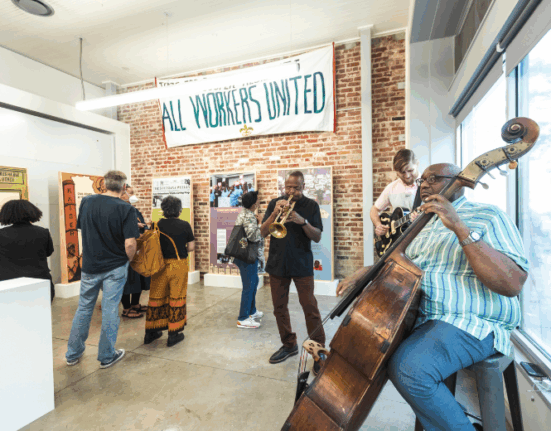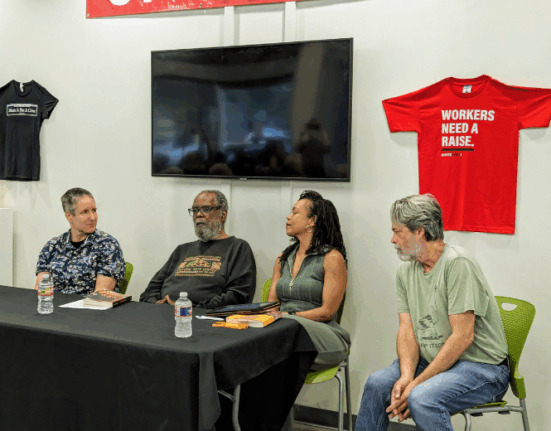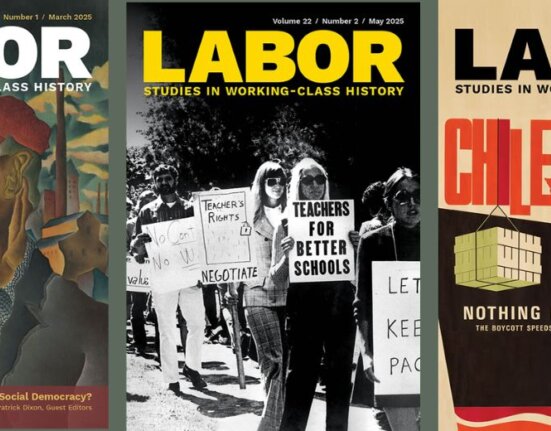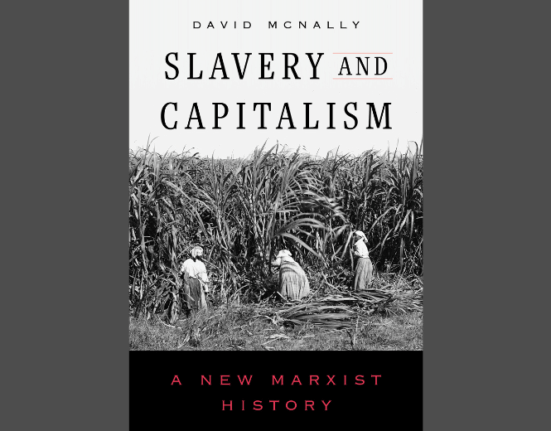We have a few brief summaries of panels and papers from the Labor and Working Class History Association conference, June 2025. If you have a comment or summary of a panel or event, send it on so it can be included. -ed.
I had the pleasure to chair two political economy focused panels on Saturday afternoon (June 14). Both drew packed and enthusiastic audiences. A personal note: I organized the “Forces” panel, inspired by a previous “Forces Acting Upon Workers” panel that I organized for LAWCHA 2023 at Rutgers University, which drew a very large overflow audience. The vigorous participation in these panels indicate a renewed interest in this type of work, demonstrated by the quality and breadth of the papers and presentations here by up-and-coming scholars.
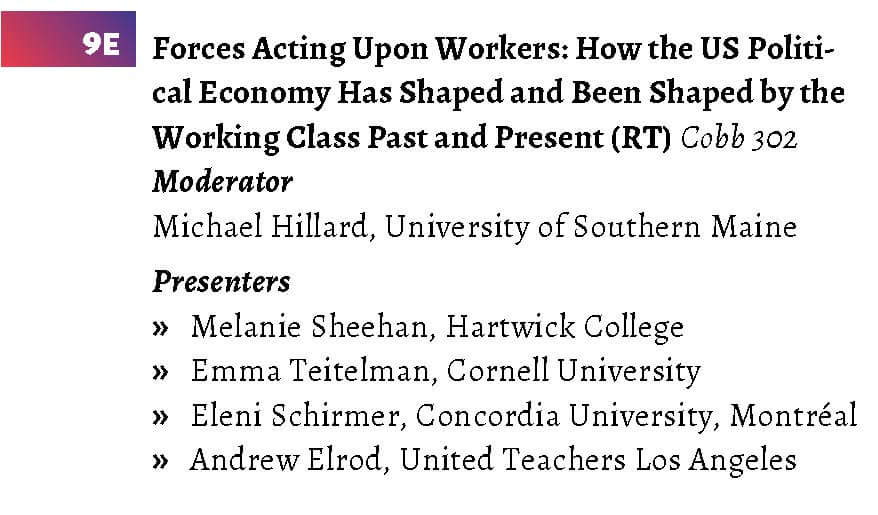
“Forces Acting Upon Workers: How the US Political Economy Has Shaped and Been Shaped by the Working-Class Past and Present” featured three young scholars and a not so young political economist turned historian. Presenters explored how the US’s capitalist political economy – the forces that “act upon workers” – shape their material experiences and fortunes. Noteworthy are the connections from past each made with pressing current questions. The panel featured a lively back and forth as presenters engaged each other with probing questions that ranged from the theoretical – “exactly who/what is ‘the capitalist’” – to practical policy e.g. “should we abolish all forms of debt imposed on the working class.” Melanie Sheehan (Hartwick College) described her work on the complex postwar history of trade union interventions on trade policy since World War II, highlighting how business, foreign trade unionists and global political leaders resisted domestic labor’s vision of a managed liberalization, with consequences for today. As this resistance hardened, managed liberalization foundered. This outcome is critical to understanding today’s contentious politics over trade. By the 1990s, the technocratic managed liberalization project was dead. In its place, organized labor developed new tactics rooted in grassroots cross-border exchanges, alliances with environmental and consumer groups, and opposition to free trade agreements. Nevertheless, union campaigns at times shared themes (i.e.: saving American jobs) with the conservative populism stoked by presidential candidate Ross Perot. Indeed, the campaigns around globalization in the 1990s foreshadowed the complex tension between transnational activism and nationalist antagonism that continue to mark the politics of international trade to this day. Emma Teitelman (Cornell University) framed a new way of looking at how class and regional forces coalesced between the Civil War and the Great Depression, proposing a new political economy of American industrialization. Her work is provoked by Richard Bensel’s The Political Economy of American Industrialization, 1877-1900 which argued for reviving the uneven development framework. She depicts how cross class alliances in the US’s developing periphery created a certain politics shaped by combined and uneven development. Key was a shared experience of oppression across classes, illustrated by the process of postbellum Southern lumber development that provoked Southern dispossessed farmers and local developers – classes that seemingly might not hold things in common – to forge an alliance based on opposition to high interest rates imposed by Eastern financial interests. This dynamic reinforced cross class political alliances rooted in the Democratic/Republican Party and center-periphery divides, thwarting working–class formation. Eleni Schirmer (Concordia University and The Debt Collective) is one of our nation’s foremost scholar-activists. She described her ongoing work on how neoliberalism intensified the transition from a tax-funded welfare state to a debt-funded one. People in the US today are forced to access the “welfare state” – healthcare, higher education, housing – through individual debt obligations, auguring a transition to a “debt–fare state.” While household debt is a systemic problem, it is not evenly distributed. Black and brown communities – and Black women in particular – have held disproportionate household debt across every category, reflecting and reproducing the ongoing theft of labor, land, and wealth. She brings special focus to how disproportionate Black and Brown household debt makes building successful working class coalitions even more challenging. Michael Hillard (University of Southern Maine) described his trade book project “Burning Down Your House: Confronting American Capitalist Class Exceptionalism” with Richard McIntyre (University of Rhode Island). They describe US’s “outlier” status of having the worst of wealth and income inequality, health outcomes, and democracy of the OECD, asking: why has the US doubled its GDP per capita since 1982 and yet see conditions for its working class majority deteriorate? Their answer is American capitalist class exceptionalism – the exceptionally reactionary, extreme, and violent history and character of American capital. Once comprised of dictatory industrialists and now roguish finance, retail, tech oligarchs, capital has long engaged in effective class warfare at society’s expense. Capitalists have succeeded because it has politically harnessed systemic racism to reinforce its power over the state and workers. They emphasize the centrality of American capital’s massive social surplus long under capital’s control. They argue that reversing inequality and solving the climate crisis requires a higher social wage, better labor standards and rights, but especially democratic control of the surplus.
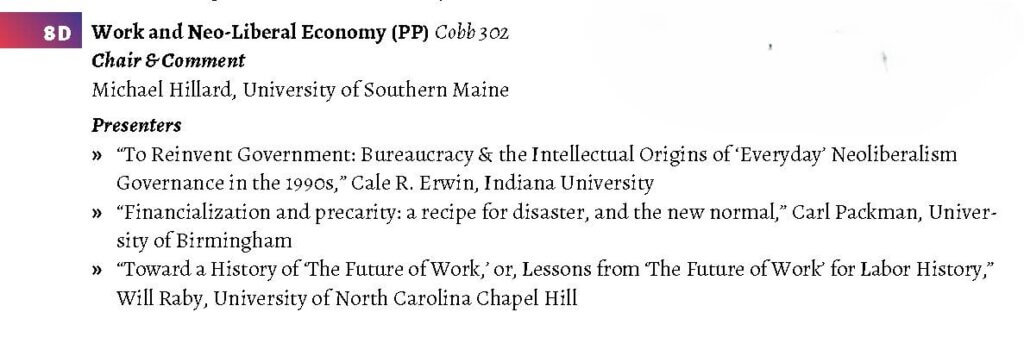
“Work and the Neoliberal Economy” featured three young scholars whose work explored intriguing questions on the topic. Cale Erwin (Indiana University) offered a case study of the complex terms of neoliberal economic development policy developed in the 1990s by Republican Indianapolis mayor Stephen Goldsmith’s embrace of centrist booster David Osborne’s “Reinventing Government” manifesto. “Reinventing government” celebrated government efficiency as a route to economic prosperity. Goldsmith embraced labor-management cooperation, which local AFSCME leaders creatively used to defend public sector workers otherwise targeted by the Osborne craze. Erwin detailed how Osborn and the Hudson Institute, a conservative think tank that designed market-oriented state and local initiatives like school privatization and “ending welfare as we know it” were part of an emerging shared consensus across both liberal and conservative policy think tanks that drove design and implementation of neoliberal policies – nationally and locally. AFSCME shrewdly positioned themselves within an emerging push to reduce and privatize public services. They did so by beating out private contractors with lower bids that reduced management layers while accepting reductions in workforce. Erwin highlights how this local union was forced to embrace rather than fight neoliberal urban policies by default rather than by design. Will Raby (University of North Carolina at Chapel Hill) unpacked the history of a neoliberal banality: “the future of work.” Coined in the 1970s, it initially connected futurist and postindustrial discourses (think Alvin Toffler and Daniel Bell) with pressing calls for “work humanization.” “Academics offered “work humanization” as a cure for “blue-collar blues” and “white-collar woes,” blamed for wildcat strikes and a rash of “dropping out.” Advocates hoped to persuade enlightened corporate executives could thus be persuaded to humanize future of work. Later, young people coming of age since the Great Recession have learned that “the future of work” requires them to “futureproof” their human capital against its trapdoors. Unsurprisingly, shared (and very online) fantasies of escaping work now proliferate — from the more egalitarian vision of “unemployment for all, not just the rich!” that animates the reddit community, r/antiwork to the individualist “FIRE movement” (financial independence –> retire early). Raby argued that although “the future of work” has grown dourer since the 1970s, the deeper story is one of continuities. The “future of work” can be dystopian as well as utopian, but never political; these limits need bursting. Finally, Carl Packman (University of Birmingham) homed in on the neoliberal project of turning workers into “asset portfolios” rather than workers, clarifying the dramatic difference between the actual lives of precarious workers who neoclassical economists might dream are happily “optimizing subject to constraint” and who are somehow supposed to use their newfound time flexibility to enrich themselves through financial investments, and the actual poverty that precarity and financialization imposes. Packman proposed turning neoliberal financialization on its heads by empowering workers as workers.
Author
-
Dr. Michael Hillard is Professor Emeritus of Economics at the University of Southern Maine. He is author of Shredding Paper: Labor and The Rise and Fall of Maine’s Mighty Paper Industry (published by Cornell); he is currently collaborating with Dr. Richard McIntyre (University of Rhode Island) on a book entitled “Burning Down Your House: Confronting America’s Exceptional Capitalist Class.” He won Labor History’s Best Article award in 2004 and <Review of Radical Political Economics’ Best Essay award for 2013. He has been an active collaborator with the labor movement since the 1970s, most recently collaborating with the successful effort to create the Charles Scontras Center for Labor and Community Education at the University of Southern Maine which is now in its second year.


